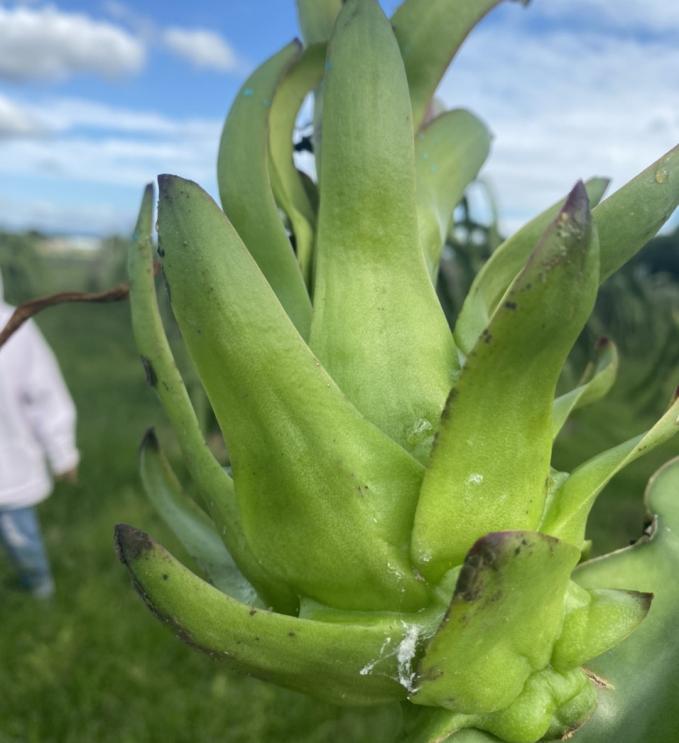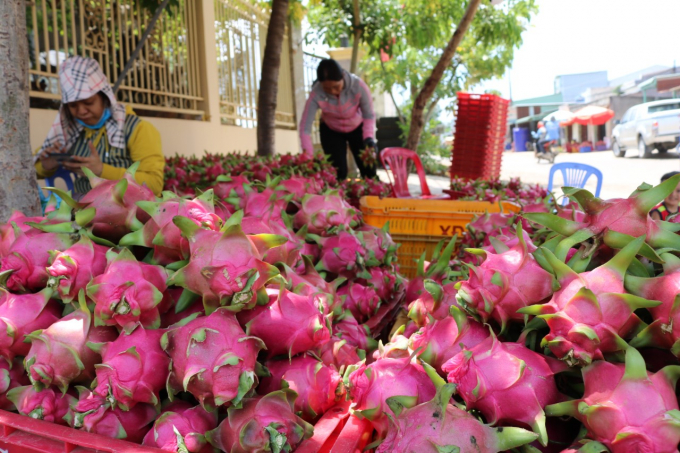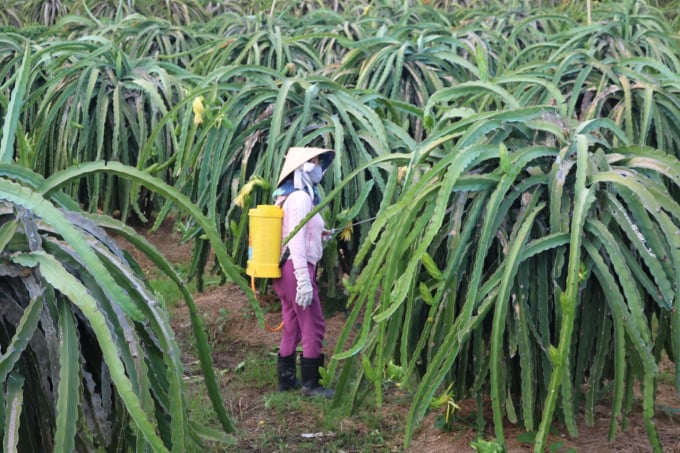November 26, 2025 | 13:19 GMT +7
November 26, 2025 | 13:19 GMT +7
Hotline: 0913.378.918
November 26, 2025 | 13:19 GMT +7
Hotline: 0913.378.918
The Plantation and Plant Protection Department of Binh Thuan Province has requested localities in Binh Thuan Province to monitor and handle harmful organisms in cultivated areas and establishments packing dragon fruits for export to China.

A dragon fruit is infected by mealybugs. Photo: CK.
According to the department, the Plant Quarantine Agency has recently detected many batches of exported fresh fruit that violated China's regulations on plant quarantine as they had been infected with harmful organisms.
Therefore, Binh Thuan Plantation - Plant Protection Sub-Department has asked the People's Committees of districts, towns and cities to direct the People's Committees of communes, townships, and specialised agencies to promote the awareness and direct farmers, organizations and individuals that are engaged in producing, purchasing and exporting dragon fruit to the local Chinese market to pay attention to harmful aphids before exporting, according to the director of the sub-department, Do Van Bao.
The action aims to proactively minimize the negative effects on the export of agricultural products in general and fresh fruits, particularly dragon fruit, to China.
It is also necessary to take measures to avoid risks and damage if harmful aphids are detected in the shipment.
Establishments purchasing and exporting dragon fruit, on detecting mealybug species, should remove them by washing or air-blowing measures. The farmers need to properly implement management measures to prevent aphids on dragon fruit gardens.
In addition, localities also need to further inspecting, monitoring, forecasting, and strictly handling harmful organisms in fruit-growing areas that have been granted export codes to China, particularly managing dragon fruit gardens and harmful aphids.

Mealybugs are currently subject to plant quarantine in China, so exporters should note to remove them before packing dragon fruits for export. Photo: KS.
In case dragon fruit garden is found to be infected with aphids, measures must be taken to eliminate and thoroughly treat aphids on the fruit before exporting.
To manage the harmful mealybugs on dragon fruit, Binh Thuan Plant Protection Department recommends that farmers regularly clean their fields, collect and destroy remnants around the dragon fruit tree.
Along with that, cut the branches with pests, clear the grass, make the garden open, create favorable conditions for the plants to grow and develop well, limiting the habitat of aphids.
At the same time, water and fertilize adequately to limit the growth of aphids. In the process of watering dragon fruit, it is recommended to use a water pump to spray strongly on places where many aphids are attached to wash away, create moisture on the tree and reduce the density of aphids.
They are also recommended to regularly inspect the garden for early detection of harmful aphids, especially during the dry season; pay attention to the parts (young shoots, flowers, fruits) that aphids often appear and cause harm; prune and destroy parts of plants that are heavily infected with mealybugs.
In addition, protect the natural enemies in the garden of aphids such as weaver ants, ladybugs, yellow-eyed beetles, tendril beetles, red bugs and parasitic wasps. In particular, weaver ants are the most effective natural enemies as they eat larvae, adult aphids and can repel and prevent adult aphids from harming and laying eggs.

Dragon fruit farmers need to apply the measures recommended by the plant protection industry to eliminate harmful mealybugs. Photo: KS.
Parasitic fungi preparations like Mertahizum anisopliae, Beauveria bassiana or Paecilomyces sp. Spray should be used to eliminate bed bugs with dosage according to the recommendations on the product packaging.
Farmers can also spray insecticides to kill aphids promptly, especially at the stage when the plants are flowering, young fruit, and developing fruit. Using pesticides in the list of permitted use such as: Spirotetramat (Movento 150OD), Abamectin (Queson 5.0EC), Azadirachtin (Agiaza 4.5EC), Buprofezin (Applaud 25SC, Butal 25WP, Difluent 25WP, Hello 700WG, Map-Judo) 25WP)... to control aphids when there is a risk of serious harm that could affect productivity and quality.
The use of the drug must follow the "4 rights" principle and ensure the isolation period. It should be noted that mealybugs have a waxy coating on the outside, so it is necessary to add an adhesive to the drug solution to increase adhesion.
According to Binh Thuan Plant Protection Department, in order to effectively manage the dragon fruit growing areas, facilities that have been granted export codes to China (according to the list of Plant Protection Department) and localities will review and update information on planting areas and packing
facilities that will be sent to the Sub-Department before September 15, 2021 to summarize, monitor and report to the Plant Protection Department.
In the process of implementation, if there are any difficulties or problems, they should contact the Cultivation Department, Sub-Department of Cultivation - Plant Protection for guidance.
Translated by Luong Huong
/2025/11/26/3627-4-082628_818.jpg)
(VAN) From a small café on the red basalt highlands, Le Van Hoang started a business with clean coffee, building Enjoi Coffee into a symbol of organic agriculture in the Lam Dong plateau.
/2025/11/25/0045-1-135246_13.jpg)
(VAN) Ca Mau is researching a model of sea-encroaching embankments combined with viaducts and logistics service zones, aiming both to prevent erosion and create land funds for marine economic development.

(VAN) The information was shared at the seminar 'Urban Agriculture - Solutions for Developing Green Spaces,' organized by the Kinh te & Do thi Newspaper and the Biotechnology Center of Ho Chi Minh City.
/2025/11/19/4141-2-132831_216.jpg)
(VAN) One of Japfa's outstanding solutions is implementing digital transformation and artificial intelligence (AI) to optimize operations, enhance productivity, and advance sustainable development.
/2025/11/19/4847-1-093540_448.jpg)
(VAN) The Gia Lai Provincial People’s Committee had a working session with the delegation of the U.S. Department of Agriculture, the State of Idaho, and representatives of the State's leading enterprises.

(VAN) Ca Mau has a sufficient foundation to become a strong regional aquaculture center, where production integrates the economy, the environment, and the lives of the people.

(VAN) SEIKI Group envisions itself as a pioneer in the ‘dual transformation’ of digital technology and green industry, standing alongside the Government and Vietnamese businesses in their pursuit of sustainable development.